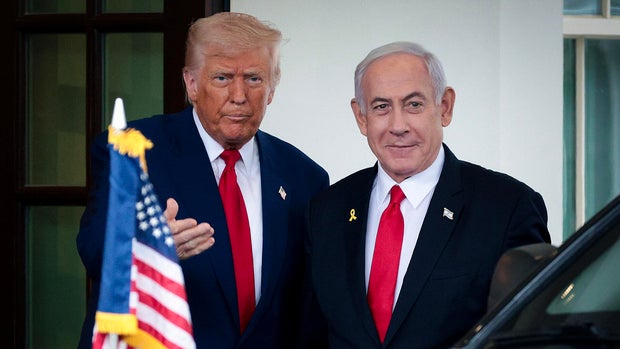Tel Aviv, Israel — Israeli Prime Minister Benjamin Netanyahu and President Trump sought to take a victory lap Monday after their recent joint strikes on Iran, hailed by both as an unmitigated success. But as they meet for the third time this year at the White House, the outwardly triumphant visit will be dogged by Israel’s 21-month war against Hamas in Gaza and questions over how hard Mr. Trump will push for an end to the conflict.
“This is a historic victory,” Netanyahu said at the White House of the strikes against Iran. “This has already changed the face of the Middle East.”
Mr. Trump has made it clear that following the 12-day war between Israel and Iran, he would like to see the Gaza conflict end soon, ideally with a ceasefire agreement reached this week. The meeting between Mr. Trump and Netanyahu could give new urgency to a U.S. ceasefire proposal being discussed by Israel and Hamas, but whether it will lead to a deal that ends the war is unclear.
“The optics will be very positive,” said Michael Oren, a former Israeli ambassador to Washington. “But behind the victory lap are going to be some very serious questions.”
Before departing for Washington on Sunday, Netanyahu praised the cooperation with the U.S. for bringing a “huge victory over our shared enemy.” He struck a positive note on a ceasefire for Gaza, saying he was working “to achieve the deal under discussion, on the terms we agreed to.”
“I think that the discussion with President Trump can certainly help advance that result, which all of us hope for,” Netanyahu said.
Israel and Hamas appear to be inching toward a new ceasefire agreement that would bring about a 60-day pause in the fighting, send aid flooding into Gaza and free at least some of the remaining 50 hostages held in the territory, 20 of whom Netanyahu says are still alive.
Abdalhkem Abu Riash/Anadolu/Getty
But a perennial sticking point is whether the ceasefire will end the war altogether. Hamas has said it is willing to free all the hostages in exchange for an end to the war and a full Israeli withdrawal from Gaza. Netanyahu has said the war will only end when Hamas is militarily defeated or surrenders, disarms and goes into exile — something the terrorist group’s remaining leaders have refused to do.
Trump’s quest to be known as peacemaker
Mr. Trump has made it clear that he wants to be known as a peacemaker. He’s repeatedly touted recent peace deals that his administration helped to facilitate — between India and Pakistan, the Democratic Republic of Congo and Rwanda, and Israel and Iran — and for years he has made little secret of the fact that he covets a Nobel Peace Prize.
Ahead of a dinner with U.S. and Israeli officials in the White House’s Blue Room on Monday, Netanyahu presented Mr. Trump with a letter he said he wrote nominating him for the Nobel Peace Prize. Netanyahu told Mr. Trump that it’s “well-deserved, and you should get it.”
“This is very meaningful,” Mr. Trump said.
He has been pressuring Israel and Hamas to wrap up their own conflict, which has killed tens of thousands of Palestinians, ravaged Gaza, deepened Israel’s international isolation and made any resolution to the broader conflict between Israel and the Palestinians more distant than ever.
But the precise details of the proposed ceasefire deal, and whether it can lead to an end to the war, are still in flux. In the days before Netanyahu’s visit, Mr. Trump seemed less certain of the chances of an imminent breakthrough.
Asked on Friday how confident he was that a ceasefire deal would come together, he told reporters: “I’m very optimistic — but you know, look, it changes from day to day.”
On Sunday evening, he seemed to narrow his expectations, telling reporters that he thought an agreement related to the remaining hostages would be reached in the coming week.
Gaza peace hinged on Trump and Netanyahu’s personal ties?
After Mr. Trump’s decision to get involved in Israel’s war in Iran with strikes on Iranian nuclear sites, he and Netanyahu have looked and sounded more in sync than ever. But that’s not always been the case.
As recently as Netanyahu’s last visit to Washington in April, the tone was markedly different.
Mr. Trump used the photo-op with Netanyahu to announce that the U.S. was entering into negotiations with Iran over its nuclear deal — appearing to catch the Israeli leader off guard and at the time, slamming the brakes on any Israeli military plan.
Alex Wong/Getty
He also praised Turkish leader Recep Tayyip Erdogan, a fierce critic of Israel’s, in front of Netanyahu, and the two made no apparent progress on a trade deal at the height of Mr. Trump’s tariff expansion.
Mr. Trump, whose policies have largely aligned with Israel’s own priorities, pledged last week to be “very firm” with Netanyahu on ending the war, without saying what that would entail. Pressure by Mr. Trump may have helped to convince Netanyahu in the past, with a previous ceasefire deal having been reached right as the president was taking office for his second term.
Netanyahu has to balance the demands of his American ally with the far-right parties in his governing coalition who hold the key to his political survival and oppose ending the war.
But given the strong U.S. support in Israel’s war against Iran, highlighted by joint airstrikes on three key Iranian nuclear sites, Netanyahu may have a tough time saying no.
When asked Monday whether he would consider another strike against Iran, Mr. Trump told reporters, “I hope we’re not going to have to do that. I can’t imagine wanting to do that.”
“They want to meet. They want to work something out,” Mr. Trump said of Iran. “They’re very different now than they were two weeks ago.”
Mr. Trump said he hoped the war between Iran and Israel is over, adding that he believes Iran wants “to make peace.”
“I’m all for it,” Mr. Trump said. “Now, if that’s not the case, we are ready, willing and able, but I don’t think we’re going to have to be.”
Netanyahu left the door open to the war resuming, telling reporters Monday that “when you remove a tumor, that doesn’t mean it can’t come back.”
On Sunday evening, Mr. Trump said one of the matters he expected to discuss with Netanyahu “is probably a permanent deal with Iran.”
Mr. Trump also may expect something in return for his recent calls for Netanyahu’s corruption trial to be canceled — a significant interference in the domestic affairs of a sovereign state.
“Trump thinks that Netanyahu owes him,” said Eytan Gilboa, an expert on U.S.-Israel affairs at Bar-Ilan University near Tel Aviv. “And if Trump thinks that he needs to end the war In Gaza, then that is what he will need to do.”
Trump’s vision for a remade Middle East hinged on Gaza
But beyond Iran is Mr. Trump’s grand vision for a new Middle East, where he hopes that additional countries will join the Abraham Accords, a series of agreements normalizing relations between Arab countries and Israel brokered during Mr. Trump’s first term.
Netanyahu and Mr. Trump are likely to discuss how to bring Syria into the fold. The country, a longtime enemy of Israel’s, has new leadership after the fall of President Bashar Assad, and experts say conditions might be ripe for some kind of nonbelligerency agreement.
Just last week, Mr. Trump signed an executive order lifting a raft of U.S. sanctions against the Syrian government, paving the way for the nation’s new leaders — former Islamist militants who publicly embraced secularism after toppling Assad — to further cement their governance and join the international community.
“I think there’s an opportunity to explore. I think that everyone understands the situation has changed. Before that, Iran was essentially running Syria directly through Hezbollah. Hezbollah has been brought to its knees. Iran is out of the picture. So I think this presents opportunities for stability, for security and eventually for peace,” Netanyahu said Monday at the White House.
But Mr. Trump’s ultimate goal is to include regional powerhouse Saudi Arabia.
The Saudis, whose clout could open the door for other Arab or Muslim countries to join, have expressed interest in normalizing ties with Israel but only if it is accompanied by serious steps toward resolving Israel’s conflict with the Palestinians. For starters, that would seem to require action in Gaza.
“The most important thing (for Mr. Trump) is to end the war in Gaza,” Gilboa said. “That is the key to all the regional peace in the Middle East.”




